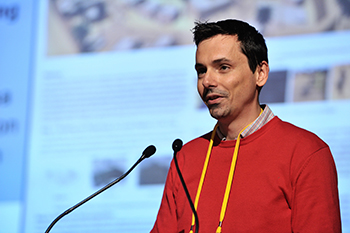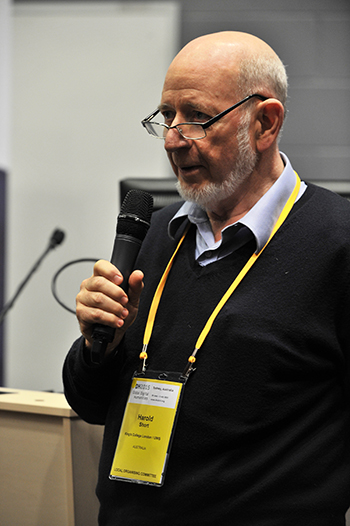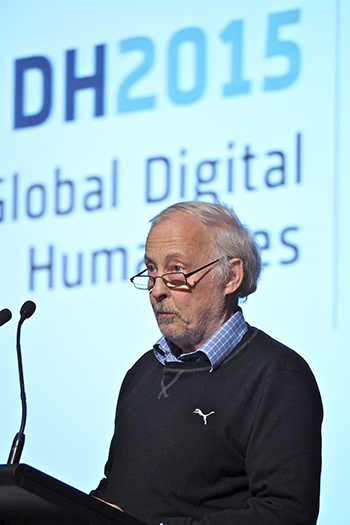Our People
Executives | |||
|---|---|---|---|
| Simon Burrows, Professor in History and Digital Humanities, School of Humanities and Communication Arts (Click to view Profile). My involvement with Digital Humanities began in 2006, when I initiated the award-winning French Book Trade in Enlightenment Europe database project, which is ongoing. Since 2016 I have been leader of the DHRI/DHRG and advised or collaborated on numerous projects. My DH-related projects include: The French Book Trade in Enlightenment Europe; Mapping Print, Charting Enlightenment; Libraries, Communities and Cultural Formation; Database to enhance Japanese-Australian intellectual and industrial collaboration; ARCHiVER; Digitizing Enlightenment; CAPOS; Building Digital Humanities. My main DH skills and competencies are: Database design; Heurist; project ideation; open scholarship; linked data; mapping and data visualisation (nb. I am not a programmer). | |||
Hart Cohen, Professor in Media Arts, School of Humanities and Communication Arts (Click to view Profile) My involvement with Digital Humanities began in 2006 with a database documentary based on TGH Strehlow’s memoir, Journey to Horseshoe Bend. I have acted as Deputy Head of the DHRG, School of Humanities and Communication Arts and Convenor of the Masters in Digital Humanities, WSU. My DH-related projects include: analyses of annotations relating to Shakespeare’s hand in an edition of Lambarde’s Eirenarcha; co-editing an anthology of Edmund Carpenter’s archived media anthropology, a virtual mediation of TGH Strehlow’s Journey to Horseshoe Bend; the Building the Digital Humanities program, and collaboration with Pondicherry University’s (india) SPARC-funded Digital Humanities Program. My main DH skills and competencies are: database documentary; archives and mediation; practice-based research applications in the Digital Humanities; pedagogical approaches to the Digital Humanities. | |||
| Rachel Hendery, A/Professor in Digital Humanities, School of Humanities and Communication Arts (Click to view Profile) | |||
| Liam Magee, Senior Research Fellow, Institute for Culture and Society (Click to view Profile) | |||
Brett Neilson, Professor, Institute for Culture and Society (Click to view Profile) My work crosses digital humanities by using digital research methods to understand the social and cultural consequences of information and communication technologies. This approach combines with sited empirical observation and concept production to offer broad contours for understanding political and economic transformations in the contemporary world. I have been lead investigator or co-investigator on the following DH-related Australian Research Council-funded projects: 2020-2023 Discovery Grant, ‘The Geopolitics of Automation’; 2016-2022, Discovery Grant ‘Data Centres and the Governance of Labour and Territory’. My main DH skills and competencies are: Project conceptualisation and execution, click HERE for example. | |||
| Tanya Notley, A/Professor in Communication, School of Humanities and Communication Arts (Click to view Profile) | |||
| Kate Richards, Senior Lecturer, School of Humanities and Communication Arts (Click to view Profile) | |||
| Ned Rossiter, Professor, Director of Research, Institute for Culture and Society (Click to view Profile) | |||
David Tait, Professor in Digital Humanities, School of Humanities and Communication Arts (Click to view Profile) My main involvement with the Digital Humanities is through my research into virtual courtrooms. My current project on the virtual courtroom, the latest of many, is funded by the Canadian SSHRC through the University of Montreal and details are available HERE. I am a mentor on the Building Digital Humanities project. My main DH skills and competencies concern virtual courtrooms. | |||
Members | |||
| Diane Colman, Lecturer in Asian Studies and International Relations, School of Humanities and Communication Arts (Click to view Profile) | |||
Navin Doloswala, Lecturer in Communication, School of Humanities and Communication Arts (Click to view Profile) My involvement with digital humanities formally started with my joining the Digital Humanities Research Group in 2017. My Digital Humanities projects have involved machine learning and neural network processing of photographic image, video content and immersive video content. This work has significantly involved fire and fire performance and elements of spirituality and heritage. This work has been presented at national and international conferences, creative arts and music festivals and will be part of an exhibition / installation at the Institute for Australian and Chinese Arts and Culture (IAC) in September 2022 as part of the 21C minor in Equitable Technologies entitled ‘Here’s lookin at you kid.’ My main skills in digital humanities revolve around the creative applications of neural net processing and the investigation of meaning making and data and digital storytelling. I am developing my coding capabilities in python to facilitate future projects and experiments. | |||
| Alison Gill, Senior Lecturer in Design (Visual Communication), School of Humanities and Communication Arts (Click to view Profile) | |||
Peter Mauch, Senior Lecturer in Asian Studies and International Relations, School of Humanities and Communication Arts (Click to view Profile) My involvement with Digital Humanities began as recently as 2021, when I began collaborating with the Foundation for Australia-Japan Studies (FAJS) and building a database to enhance Japanese-Australian intellectual and industrial collaboration. The project is funded by the Australia-Japan Foundation (AJF), and is ongoing. My DH-related projects include database to enhance Japanese-Australian intellectual and industrial collaboration; Building Digital Humanities. My main DH skills and competencies are Heurist databases. NB I am not a programmer. |



Mobile options:
